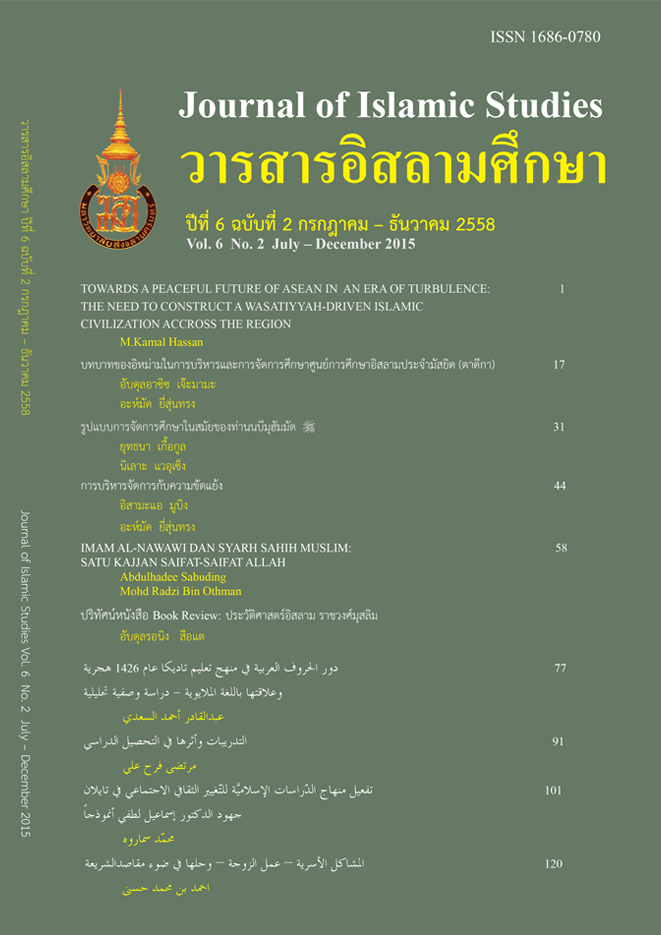The Role of the Arabic Letters in the Curriculum Tadika of the year 1426 AH and its Relationship with the Malay Language – analytical and descriptive study.
Keywords:
Arabic Letters, Curriculum, Tadika, Malay LanguageAbstract
This study aims to identify the role of the Arabic letters in the Curriculum Tadika of the year 1426 AH. issued by The Twelfth Education Region and their relationship with the Malay language challenges faced by the Malay language which are written in Arabic script. The researcher studied Tadika curriculum and prescribed textbooks for it in Patani, Southern Thailand. It is a documentary study, where the researcher followed the descriptive analytical approach. The research has found that the Malay language written in Arabic script appeared in the writings of early scholars in Al-Fatoni since the year 1224 AH. The curriculum Tadika of the year 1426 AH. includes eight subjects, and all are written in Arabic script, except the subject of Malay language, which is divided into two sections: one is written in Arabic script and the other is written in Latin script letters used Arabic for writing the Malay language, in addition to some letters that fit with the local Malay sounds namely cha(خ ), nga (غ), nya(ث ), and ga (ئ). The research also found that the prescribed textbooks of this curriculum give an ample opportunities to students to acquire the Malay language written in Arabic script. However, the Malay language written in Arabic script faces a number of challenges such as lack of a body or a special arrangement to preserve, nurture and to transmit it to future generations; and the inadequacy of teaching the Malay language written in Arabic script.
References
أحمد فتحي الفطاني، (2001)، علماء بسر دري فطاني ، يونيبر سيتي كبغسأن مليسيا، باغي، دار الإحسان ، سلاغور كوالالمبور.
عبدالقادر أحمد، (2001)، دعوة إسلامية، ساتو كاجين ترهادف سجاره فركمباغن فنديديقكن إسلام دالم مشاركة ملايو فطاني: ساتو فغنالن، دالم جورنال فغاجين إسلام، كوليج إسلام جالا، بيلاغن 1 سبتمبر 2001.
محمد باخير الحاج عبد الله، (2006)، الخصائص اللغوية بين العربية والملايوية : دراسة مقارنة ، إسلاميات 28 / 2006، الجامعة الوطنية ماليزيا، باغي، كوالالمبور، ماليزيا.
محمد زمبري عبد المالك، (1994)، فطاني دالم تمدون ملايو، ديوان بهاس دان فوستاك، كوالالمبور.
وان محمد صغير بن عبد الله، ( 1998)، تاريخ فطاني شيخ فقيه على الفطاني، ورسي سالينن شيخ داود بن عبد الله الفطاني، الخزانة الفطانية ، كوالالمبور.
واراويت بارو، (1999)، داسر كراجأن دان كسنث ترهادف بهاس ملايو دنكارا تهاي، تيسيس انتوق ممنوهي كفرلوان إجازة دكتوراه فلسفة، جابتن فغاجين ملايو، يونيبرسيتي ملايا، كوالالمبور.
كلية الدراسات الإسلامية، (2005)، دت.
دليل الكلية الإسلامية جالا، (1999).
กรมการปกครอง กระทรวงมหาดไทย มาตรฐานและสาระการเรียนรู้หลักสูตรอิสลามศึกษาฟัรฎูอีน ประจำมัสยิด พ.ศ. 2548 / ฮ.ศ. 1426
الشؤون الإدارية، وزارة الداخلية، المستوى والمحتوى الدراسي لمنهج الدراسات الإسلامية الأساسية بمسجد عام 2548 بوذية الموافق 1426 هجرية.
Published
How to Cite
Issue
Section
License
Copyright (c) 2015 Journal of Islamic Studies, Prince of Songkla University, Pattani Campus

This work is licensed under a Creative Commons Attribution 4.0 International License.
All articles Published in The Journal of Islamic Studies are author’s opinions, and not the responsibility of the Faculty of Islamic Sciences nor the editorial board. However any citation should be referred to the journal.
















